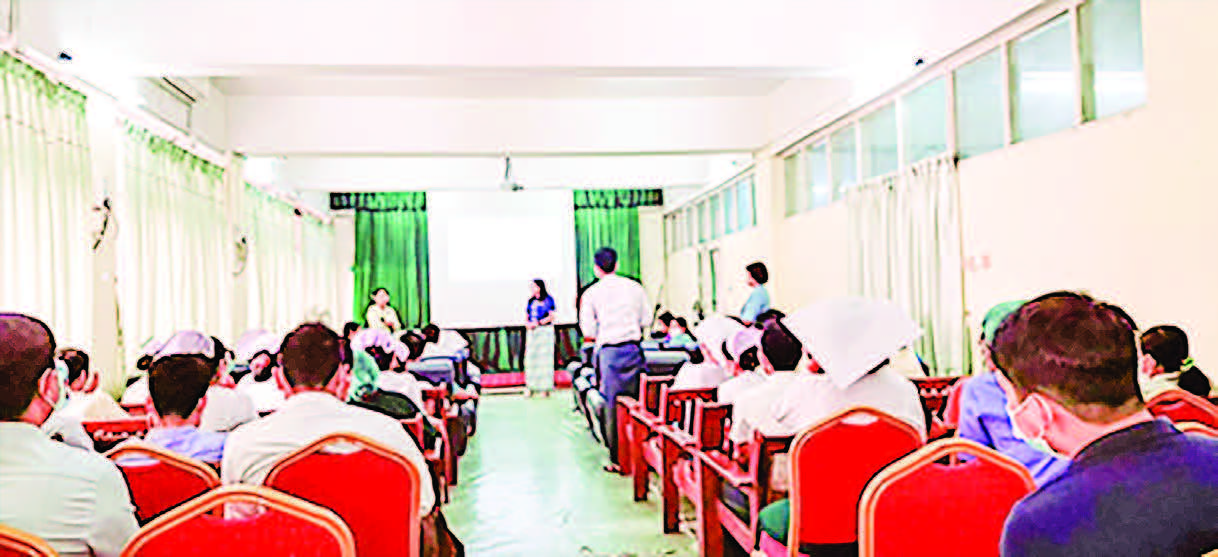By Dr Than Lwin Tun
Ministry of Health (MOH), Myanmar, laid down two objectives: to enable every citizen to attain full life expectancy and enjoy longevity of life and to ensure that every citizen is free from diseases. To do that, MOH is enhancing the conduct of CME at each and every medical corner. Continuing Medical Education (CME) is crucial in healthcare development as it ensures that healthcare professionals stay updated with the latest advancements, technologies, and best practices, as well as innovation, and promotes professional growth and development. This ongoing learning process enhances patient care, improves clinical outcomes, fosters innovation, and promotes professional growth and development.
Continuing Medical Education (CME) plays a vital role in the ongoing development and advancement of healthcare systems worldwide. The following are essential in several ways:
Improving Patient Care: Updated knowledge and skills acquired through CME help healthcare professionals provide better care to their patients. They can apply the latest evidence-based practices, which may lead to improved diagnosis, treatment, and overall patient outcomes.
Staying Current with advances: Medicine is an ever-evolving field with new discoveries, treatments, and technologies emerging regularly. CME ensures that healthcare professionals are up-to-date with these advancements, allowing them to incorporate new techniques and therapies into their practice.
Enhancing Clinical Skills: Continuing learning through CME helps healthcare professionals refine their clinical skills, including diagnostic accuracy, surgical techniques, and patient management. This ongoing skill development contributes to overall proficiency and competence in delivering healthcare services.
Adopting Best Practices: CME provides opportunities for healthcare professionals to learn about and adopt best practices in patient care, safety, and quality improvement. This fosters a culture of continuous improvement within healthcare organizations, ultimately benefiting both patients and providers.
Addressing Emerging Health Challenges: CME programs often cover topics related to emerging health issues, such as new infectious diseases, chronic conditions, or public health crises. By staying informed through CME, healthcare professionals can better prepare to address these challenges effectively.
Promoting Interdisciplinary Collaboration: Many CME activities encourage interdisciplinary collaboration by bringing together professionals from different specialities and disciplines. This collaboration fosters the exchange of ideas and experiences, leading to innovative approaches to patient care and healthcare delivery.
Maintaining Professional Standards: CME requirements are often mandated by regulatory bodies and professional associations to ensure that healthcare professionals maintain high standards of practice throughout their careers. Meeting these requirements demonstrates a commitment to ongoing learning and professional development.
Adapt to Change: CME helps healthcare professionals adapt to changes in healthcare policies, regulations and guidelines, ensuring compliance and promoting patient safety.
Reducing Medical Errors and Adverse Events: Updated knowledge and skills acquired through CME can help reduce medical errors and adverse events, ultimately improving patient safety and quality of care. Healthcare professionals who participate in CME are better equipped to identify and mitigate risks in clinical practice.
Address Knowledge Gaps: CME allows healthcare providers to address knowledge gaps in specific areas of practice.
Integration with Practice: Aligning CME activities with needs and priorities of health care practice, emphasizing practical relevance and applicability to real-world scenarios.
Improve patient outcomes: CME can lead to better patient outcomes, including reduced morbidity and mortality rates.
Peer Learning: Facilitating peer-to-peer learning through opportunities for networking, mentorship and knowledge sharing among healthcare professionals, fostering a culture of collaboration and continuing learning.
Research and Innovation: CME enhances patient outcomes by keeping healthcare professionals up-to-date on the latest research, technologies, and innovative ways of thinking.
Supporting Lifelong Learning: Healthcare is a lifelong learning journey, and CME provides structured opportunities for professionals to continue learning and growing throughout their careers. This commitment to lifelong learning is essential for maintaining relevance and adaptability in a rapidly changing healthcare landscape.
Ethical Considerations: CME can support ethical principles, including transparency, objectivity and integrity.
Global Perspective: With advances in technology and globalization, CME can provide healthcare professionals with access to international perspectives, best practices and collaborations, enriching their knowledge and skills.
Moreover, CME helps healthcare providers adapt to changes in healthcare policies, regulations and guidelines, ultimately leading to better healthcare delivery and overall system improvement.
In addition, CME is crucial for the ongoing development and improvement of healthcare systems worldwide. By investing in CME, healthcare professionals can enhance patient care, stay current with advances in medicine, maintain high standards of practice, and contribute to the overall advancement of healthcare delivery.



